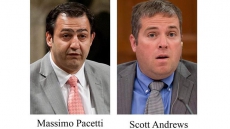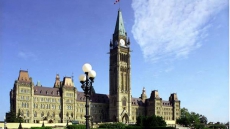OTTAWA — Canada's Metis and non-status Indians will learn Thursday whether the Supreme Court will hear a high-stakes landmark case that could extend the federal government's responsibilities to hundreds of thousands of off-reserve Aboriginal Peoples.
All three key players have a great deal riding on the decision of the top court, which could ultimately result in a number of different outcomes.
The Metis could eventually end up on a level playing field with Canada's other two Aboriginal Peoples, the First Nations and the Inuit, or find themselves back on the outside looking in.
Non-status Indians could win back the seat at the table that was taken away earlier this year by the Federal Court of Appeal, which ruled that they weren't considered "Indians" under the Constitution. They might also be shut out of the conversation altogether.
The federal government could get another crack at arguing that the Metis and non-status Indians should not be entitled to the same programs, services and rights as First Nations and Inuit. Or it could be forced to accept the decisions of the lower courts, start reshaping its policies and enter into negotiations with the Metis.
The federal government and groups representing off-reserve aboriginals are both appealing a decision by the Federal Court of Appeal in a case started 15 years ago by Metis leader Harry Daniels.
The Congress of Aboriginal Peoples, along with several Metis and non-status Indians, took the federal government to court in 1999, alleging discrimination because they were not considered "Indians" under a section of the Constitution Act, and thus have been denied certain benefits.
Both the Metis and non-status Indians scored a major victory last year when the Federal Court recognized them as "Indians" under the Constitution. The federal government appealed that ruling.
Earlier this year, the appeals court upheld part of the decision. It ruled that while Metis should remain Indians under the Constitution, extending that recognition to non-status Indians should be done on a case-by-case basis since it is a separate issue.
The Congress of Aboriginal Peoples — which represents both non-status Indians and Metis — appealed the Federal Court of Appeal's decision.
"The decision of the Court of Appeal was flawed in our view, as it drew an unhelpful distinction between the federal government's responsibility for non-status Indians and its responsibilities toward Metis peoples and status Indians," Congress of Aboriginal Peoples National Chief Betty Ann Lavallee said in a statement.
The federal government, meanwhile, is appealing both lower courts' decisions to extend Indian status to the Metis while arguing the appeals court was right to conclude that non-status Indians as a whole should not constitutionally be considered Indians.
The Metis National Council, which is an intervener to the case, wanted the federal government to drop its appeal and start working out an agreement with the Metis people.
But not all Metis people.
The head of the Metis National Council wrote to Prime Minister Stephen Harper earlier this year, urging him to accept the Appeal Court's decision and restrict the definition of Metis to people in central and western Canada.
"The Federal Court of Appeal, in effect, ruled out those people in eastern Canada who identify as Metis but do not have an ancestral connection to historical Metis communities," wrote Council President Clement Chartier.
"I recall at our last meeting on April 29, 2013, when we discussed this matter with Minister Valcourt, you clearly understood and articulated the distinction between this group and the historic Metis community that emerged along the fur trade route in western Canada."
The Canadian Press obtained a copy of Chartier's April 23 letter to Harper under the Access to Information Act.
In it, Chartier warns that broadening the definition to include people from eastern Canada could result in a huge surge in people claiming to be Metis.
He likened it to what happened when the government established a new First Nation in Newfoundland, the Qalipu Mi'kmaq, and promptly received many more membership applications than anyone had expected.
"Given the egregious situation in Newfoundland re: Qalipu Mi'kmaq, one can only imagine the disastrous fiscal consequences if the long-standing claims of the Congress of Aboriginal Peoples on Metis identification had been upheld by the Federal Court of Appeal," Chartier wrote to Harper.
The prime minister replied a month later. He thanked Chartier for his letter and told him that it was up to Justice Minister Peter MacKay whether or not to appeal the decision.
Lavallee took exception to Chartier's letter.
"There is a suggestion in the letter that the MNC shares with the federal government a desire to limit the rights of aboriginal people in the country — through a narrow geographical definition of who is Metis and by negatively characterizing the Qalipu membership process — which we find troublesome in the extreme," her statement said.
"Self-determination is fundamental to the exercise of the aboriginal rights recognized in section 35 of Canada's Constitution. CAP wholeheartedly supports that right and is working toward its recognition on behalf of all Aboriginal Peoples in Canada."





